News
Vol.81 February
- Securing global competitiveness in semiconductors and enhancing technology industrialization
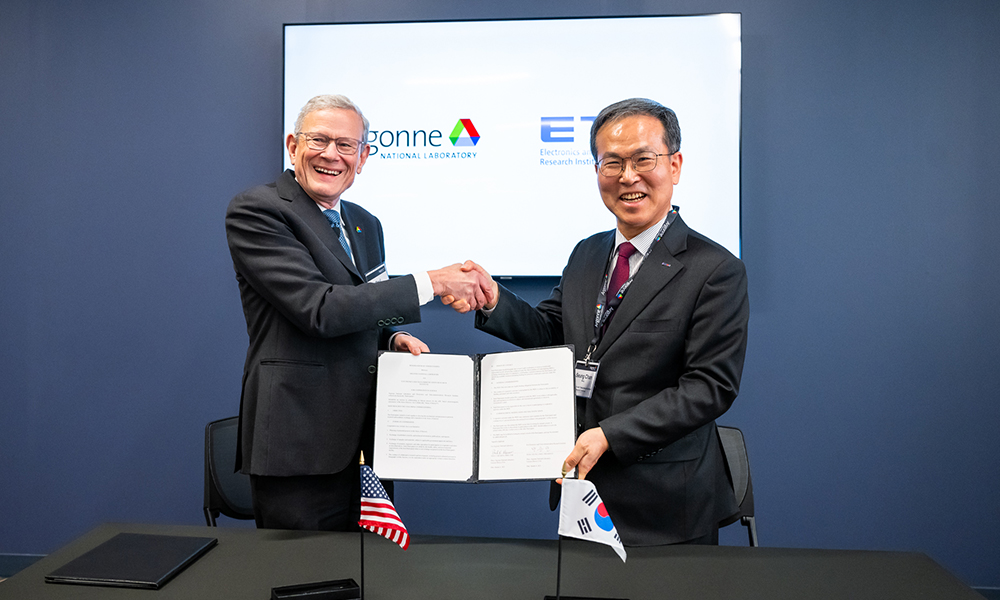 ETRI-ANL Semiconductor Technology Cooperation MOU Signing Ceremony (Left: Paul Kearns, ANL Director, Right: Bang Seung Chan, the president of ETRI, Source: ANL)
ETRI-ANL Semiconductor Technology Cooperation MOU Signing Ceremony (Left: Paul Kearns, ANL Director, Right: Bang Seung Chan, the president of ETRI, Source: ANL)
Korean researchers will begin collaborating in earnest with the U.S. Department of Energy’s (DOE) Argonne National Laboratory (ANL) on semiconductor technology research.
Electronics and Telecommunications Research Institute (ETRI) announced on Jan. 6 (local time) that it has agreed to establish a mutual cooperation system to develop semiconductor technologies with Argonne National Laboratory in Illinois, USA.
ETRI has possessed the technology to develop and manufacture silicon detectors1) for high-energy particle detectors since the early 2000s and is the only government-funded research institute in Korea capable of silicon batch processing2).
ANL has been collaborating with ETRI since 2023 to build a monolithic active pixel sensor (MAPS)3) with a complementary metal-oxide semiconductor (CMOS) IC4).
With this cooperation system established, ETRI and ANL plan to join forces to develop new semiconductor technology to detect and analyze high-energy particles generated in space environments.
Bang Seung Chan, the president of ETRI, said, “The MOU to collaborate on semiconductors will combine ANL’s research capabilities with ETRI’s technology to open up new opportunities for the future.”
Paul Kearns, the director of ANL, also said, “We hope that by expanding our cooperation to various technological fields in the future, as well as the Electron-Ion Collider (EIC)5), we can serve as a foundation for technological development between the two countries.”
Through this MOU, ETRI will strive to manufacture semiconductor detectors domestically to secure the competitiveness of semiconductor technologies that can withstand extreme environments with high and low temperatures and strong radiation, and contribute to the industrialization of technologies in the aerospace and defense sectors.
On the same day, ETRI held a meeting with about 10 Korean scientists at ANL to hear their opinions on local research activities and international R&D cooperation, and to discuss mutual cooperation plans.
1) Silicon detector: A silicon semiconductor used to detect charge carriers generated by particles such as radiation and photon
2) Silicon batch process: Hundreds of process steps from start to finish to create a silicon-based semiconductor chip
3) Monolithic active pixel sensor (MAPS): An acronym for Monolithic Active Pixel Sensor, a silicon semiconductor that integrates a detector to detect charge carriers produced by particles and a CMOS IC to process the electrical signal generated by the detector
4) Complementary metal-oxide-semiconductor (CMOS) IC: An acronym for Complementary Metal-Oxide-Semiconductor Integrated Circuit, a semiconductor component designed to minimize power consumption and enable high-speed operation by integrating numerous electronic components, including n-type and p-type transistors, resistors, diodes, capacitors, and inductors, on a single small chip
5) Electron ion collider (EIC): An experimental device that rapidly accelerates electrons, which are very small particles, to collide with ions to study the basic structure of the universe, how matter forms, and how particles in the universe interact.
Jung Dong Yun, Center Director
Semiconductor Materials Components Equipment Technology Center
(+82-42-860-5446, dyjung14@etri.re.kr)
- Developing “Trust Data Connectome” technology to strengthen data sovereignty
- Advancing future data security research in preparation for the commercialization of quantum computers
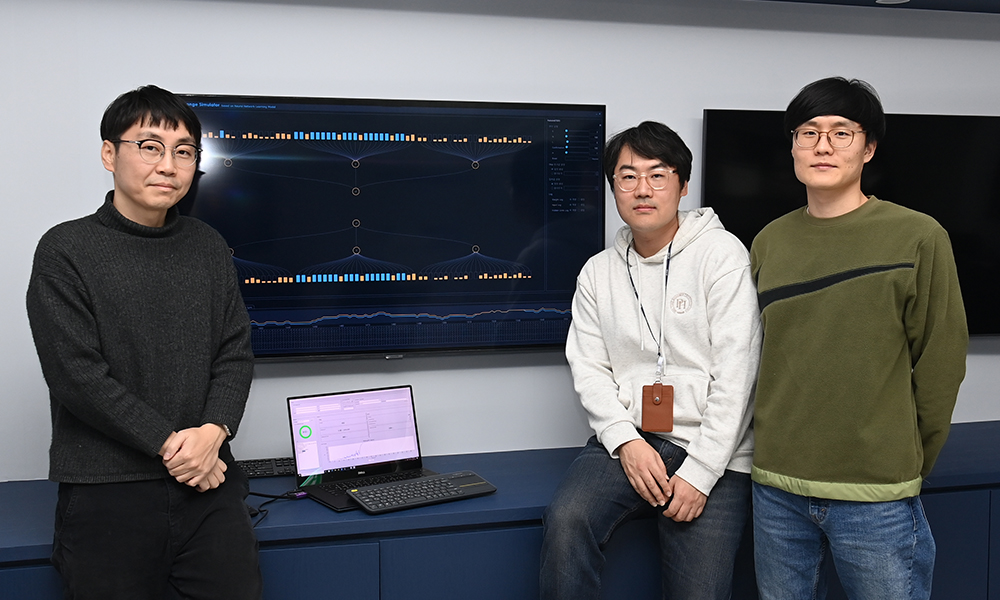
Korean researchers have succeeded in developing key technologies to strengthen personal data sovereignty, and research on security technologies for the era of quantum computer commercialization is in full swing. This is expected to open a new chapter in the information security and data industry.
Electronics and Telecommunications Research Institute (ETRI) announced that it has developed a ‘personal data trust distribution platform (Trust Data Connectome Technology)1)’ to ensure personal data sovereignty, breaking away from the existing data industry environment centered on big tech companies.
While data has been managed by companies so far, a foundation has now been established for individuals to manage their own data securely and efficiently.
The research team has dramatically improved the efficiency and security of neural network-based cryptography. It developed a technology that allows data encryption keys to be exchanged without the need for a trusted authority.
1) Personal data trust distribution platform (Trust Data Connectome Technology): Data transaction/utilization trust infrastructure that provides data sovereignty and secure exchanges for data generated by people, objects (space, biological, information, business), etc., through organic interaction in a hyper-connected intelligent society, enabling data transaction/utilization without the intervention of trusted third-parties (companies, etc.)
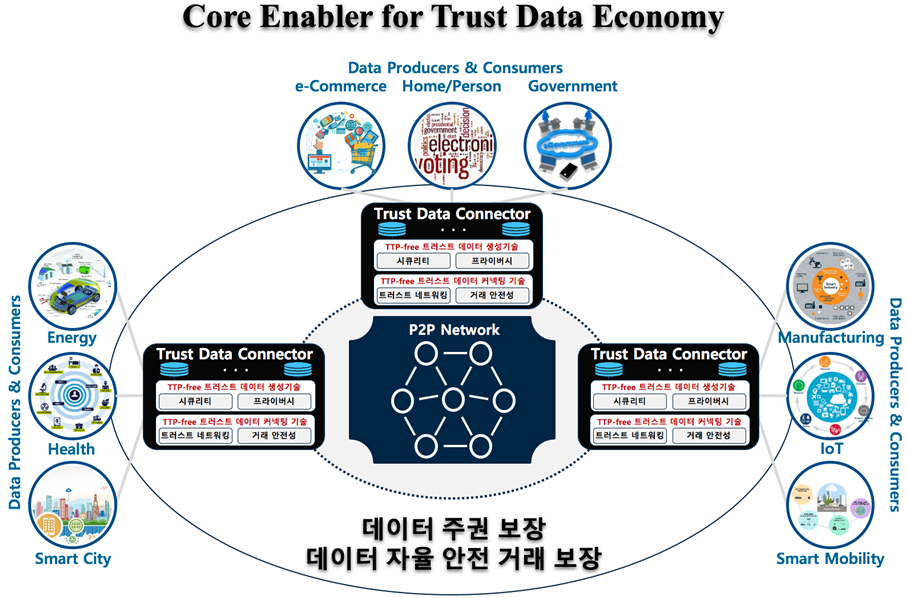 Conceptual diagram of personal data trust distribution platform (trust data connectome technology, tasks/technologies developed and completed)
Conceptual diagram of personal data trust distribution platform (trust data connectome technology, tasks/technologies developed and completed)
The technology can complete cryptographic key exchanges2) in less than 320 milliseconds (ms), demonstrating its practical utility. In addition, the research team developed a “trust data validation model” using zero-knowledge proofs3) to validate without data leakage when transacting data between individuals.
This model allows you to choose the level of validation based on the importance of your data. It is now possible to ensure the authenticity of data transactions without the need for a trusted authority. This allows you to apply levels of validation based on the sensitivity and scope of use of the data when trading personally generated data, such as healthcare data and driving data, to make data transactions more secure while still being efficient.
ETRI researchers improved the vulnerabilities of blockchain networks to enhance the security of decentralized structures to strengthen personal data sovereignty, confirmed the possibility of partitioning attacks on the Ethereum network4), and completed network patches in cooperation with Ethereum developers.
The research was presented and recognized at the Network and Distributed Systems Security Symposium (NDSS)5), the premier international conference on security. They have also developed a network security protocol (TTP-Free TLS)6) technology that is suitable for decentralized structures, implementing permission delegation and revocation features not provided by traditional TLS protocols.
The technology has been recognized by the international conference ACSAC7) with the Artifact Functional/Reusable Badge Award.
ETRI’s Cybersecurity Research Center has achieved excellent academic results with 32 SCIE papers published through this assignment. In addition, the center verified the practicality of the technology in collaboration with the Korea Minting and Security Printing Corporation. Based on these achievements, the research team is now pursuing research in earnest to prepare for the era of quantum computing as the commercialization of quantum computers becomes a reality.
2) Cryptographic key exchange: The process by which two parties agree on a symmetric key (or session key) or exchange public keys in order to communicate securely
3) Zero-knowledge proof: A technique for proving that a statement (or proposition) is true without revealing specific information; used in security technology to prove that a cryptographic problem can be solved but not reveal the specific solution
4) Possible partitioning attacks on the Ethereum network: An attack technique that artificially divides the Ethereum network into multiple fragmented groups to limit or delay communication, causing transactions or block production in one group to not propagate to other groups in a timely manner, leading to network fragmentation and disruption
5) Network and distributed systems security symposium (NDSS): An acronym for Network and Distributed System Security; one of the world’s leading conferences in the field of network and distributed system security, organized by the Privacy and Security Research Group of the Internet Research Task Force (IRTF) and first held in San Diego, California in 1993 Since then, the Internet Society has held the conference.
6-1) Network security protocol (TTP-Free TLS): An acronym for Trusted Third-Party-Free TLS; a form of TLS that minimizes the reliance on a separate certificate authority (CA) or trusted third party (TTP) for password signing or certificate verification in TLS
6-2) Network security protocol (TLS): A protocol that provides an encrypted channel for internet-based communications, such as web browser or server, and is essential to many services, including HTTPS
7) Conference ACSAC: An acronym for the Annual Computer Security Applications Conference, an international conference for sharing the latest research results and practices in computer and network security, which began in 1985 and is in its 40th year, making it the second oldest conference in the security field after the IEEE Symposium on Security and Privacy
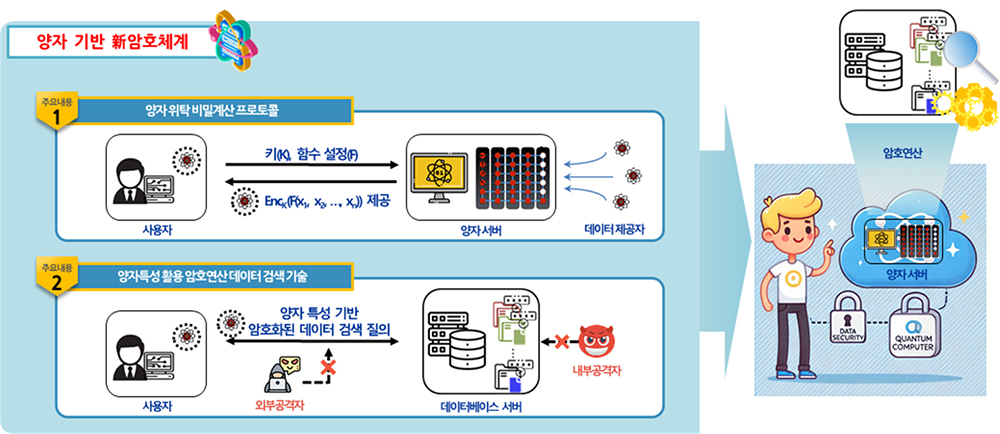 Conceptual diagram of a new cryptosystem that actively utilizes quantum properties (tasks/technologies in progress)
Conceptual diagram of a new cryptosystem that actively utilizes quantum properties (tasks/technologies in progress)
Unlike existing post-quantum cryptography (PQC)8) and quantum key distribution (QKD)9) technologies, which either perceive quantum computers as a threat or only utilize some quantum properties, the research team sets out to develop a new cryptosystem that actively exploits quantum properties.
This technology aims to revolutionize information security by leveraging the non-replicability and superposition properties of quantum computers. It is expected to become an essential basic technology for the safe utilization of quantum computers.
Kim Jeong Nyeo, the assistant vice president at ETRI’s Cyber Security Research Division, said, “Beyond the digital computing era, we will develop safe information security technology in the quantum computing era to lead personal data protection and quantum security innovation. In addition, we will provide a core foundation for the development of the future data industry by contributing to the establishment of a sustainable data ecosystem.”
This achievement was made possible through ETRI’s basic project “Creating Innovative Growth Drivers by Developing Convergence Technologies for National Intelligence.”
8) Post-quantum cryptography (PQC): As the advent of quantum computers raises the risk that classical cryptographic algorithms such as RSA and ECC will be quickly cracked, this is a cryptographic technique designed based on problems that cannot be efficiently solved even by quantum computers
9) Quantum key distribution (QKD): A technology that distributes encryption keys using the attributes of quantum mechanics, the great advantage of which is that wiretapping is impossible (wiretapping is detected in real time)
Chung Do Young, Senior Researcher
Cryptography Engineering Research Section
(+82-42-860-1302, thisisdoyoung@etri.re.kr)
- Supporting the participation of 5 companies including ETRI- startups and ETRI Laboratory Enterprises
- Confirmed the reputation of the Startup incubator by winning five innovation awards
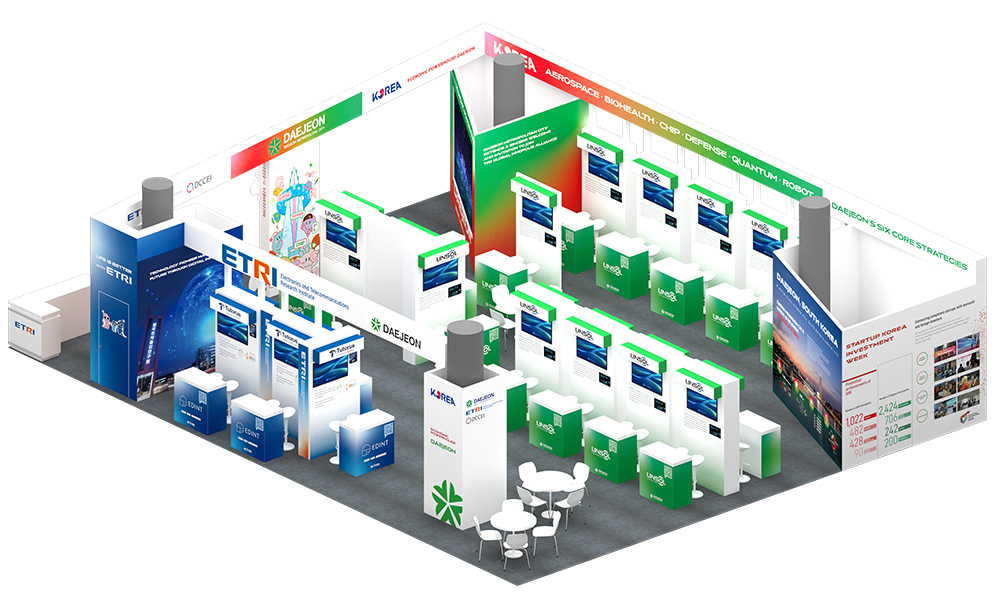
Korean researchers participated in CES, the world’s largest ICT exhibition, to challenge the first year of commercialization of global startups.
Electronics and Telecommunications Research Institute (ETRI) participated in CES 2025 with Daejeon Metropolitan City to explore opportunities for ETRI-startups and ETRI Laboratory Enterprises to expand overseas and support their global growth.
At CES 2025, ETRI participated alongside Daejeon-based companies by creating five booths in the integrated exhibition hall prepared by Daejeon Metropolitan City.
The participating companies included DigitalScent Co., Ltd. (Lee Hae Ryong), Quantum Eye Co., Ltd. (Choi Bum Suk), Tutorus Labs Inc. (Park Jeon Gue, these three companies are ETRI-startups), FARMCONNECT Inc. (Kim Mu Hyun), and Edint Inc. (Won Dong Il, these two companies are ETRI Laboratory Enterprises).
ETRI has been working with Daejeon Metropolitan City and Daejeon Center for Creative Economy & Innovation to strengthen the global innovation capabilities of companies participating in this event, including selecting companies to participate in CES 2025, providing support for booth rentals and promotions, exhibitions, and consulting.
Through this, one of ETRI-startups ‘Tutorus Labs Inc.’ and one of ETRI Laboratory Enterprises ‘FARMCONNECT Inc.’ in the Daejeon Integrated exhibition hall were honored as CES Innovation Awards.
In addition, one of ETRI-startups ‘Solarinno (Pak Hun Kyun)’ exhibited at KOTRA Korea Integrated Exhibition Hall, one of ETRI Laboratory Enterprises ‘ILias AI Co.,Ltd. (Ko Bum Suk, Seo Jung Gook)’ exhibited at the Incheon Free Economic Zone Authority booth, and one of ETRI Laboratory Enterprises ‘Leadpoint System, Inc. (Baek Eun Ju, Kim Do Hyoung)’ exhibiting separately won additional CES Innovation Awards, and the total number of five ETRI-born companies were honored with the CES Innovation Awards.
This was an opportunity for ETRI to once again confirm the reputation and status of the ‘Technology Startup Incubator’.
Looking at ETRI’s technologies exhibited at the Daejeon Exhibition Hall with Daejeon Metropolitan City and Daejeon Center for Creative Economy & Innovation, firstly DigitalScent Co., Ltd., introduced a ‘ScentSmart : Sniffing Dementia Early Detection Device.’
This is a groundbreaking device that can quickly and accurately test for early symptoms of dementia using digital olfactory technology. It is gaining attention as a new alternative for early dementia diagnosis as it can test for early dementia symptoms within 5 minutes through integrated sensory technology that links smell and imagery.
Secondly, Quantum Eye Co., Ltd. introduced ‘CarFaceID’. This is an application of cutting-edge facial recognition AI technology to the front of the vehicle in addition to existing vehicle recognition methods. This is a next-generation vehicle security technology solution inspired by human facial recognition technology.
It uses AI technology that identifies the unique front features of the vehicle (shape, design, color, etc.). It can be utilized in high-security facilities such as government buildings, embassies, military bases, etc.
Thirdly, Tutorus Labs Inc., introduced ‘learnCoach’. ‘learnCoach’ is a personalized, real-time learning support service for elementary, middle, and high school students (K-12).
It’s an intelligent learning coaching system that goes beyond simply providing the correct answers to help students understand and solve problems on their own. ‘learnCoach’ will lead a new learning paradigm in the global edutech market.
The fourth company, FARMCONNECT Inc., exhibited ‘Pollination Bee Activity Monitoring Solution (Connect Bee)’. It is a solution that monitors bees used for crop pollination, analyzes bee activity and distinguishes between males and females by using AI, and responds immediately when an abnormality occurs.
It is patent-pending in 40 countries including the US and Europe, and has been patented in Korea, Japan, etc. It increases crop yields and makes a significant contribution to sustainable agriculture and ESG.
The last company, EDINT Inc., unveiled a ‘Mobile-based AI Online Exam Automated Management and Supervision Service’. It is a mobile-based AI online test automated proctoring SaaS (software as a service) that utilizes AI computer vision technology.
It is a 100% unattended proctoring SaaS by which AI proctors administer online tests to candidates’ phones. This service can be run automatically by simply scheduling a test without the need for additional operations/monitoring staff.
Meanwhile, the booth, which ETRI first organized with Daejeon Metropolitan City to explore overseas expansion opportunities for ETRI-startups and ETRI Laboratory Enterprises and to support their global growth, was located in the Daejeon Integrated Exhibition Hall at Eureka Park, a startup exhibition center of the Venetian Expo in Las Vegas, USA.
In the future, ETRI plans to provide support for the global innovative growth of ETRI-startups and ETRI Laboratory Enterprises in various ways.
Bang Seung Chan, the president of ETRI, said, “We will continue to pay attention to the global growth in innovation of our startups and laboratory enterprises in the future. We are reviewing various ways to show interest in local issues through exhibitions with Daejeon City and to exchange and cooperate with startups in terms of technology. We will fulfill our role and responsibility as a technology pioneer leading digital innovation while supporting Daejeon City’s innovation growth projects.”
Kil-Ho Chong, Director
Public Relations Section
(+82-42-860-0670, khchong@etri.re.kr)